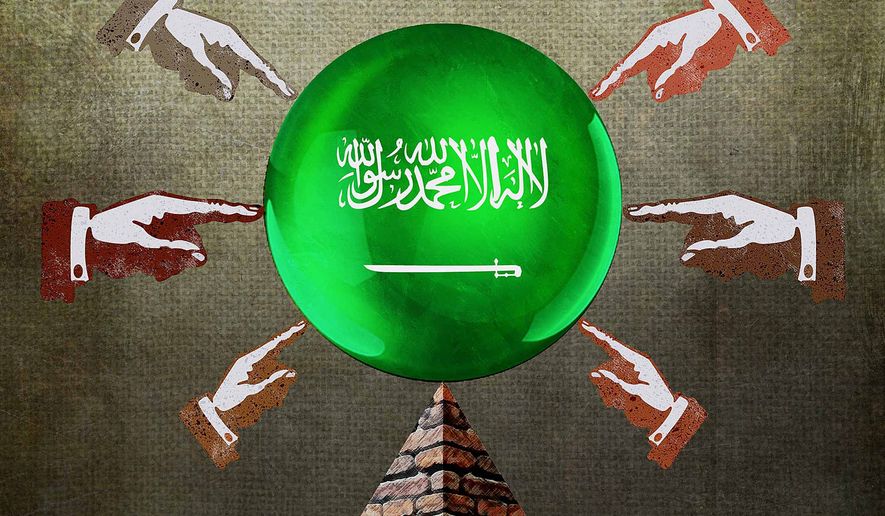OPINION:
President Trump’s statement this week in defense of an America First foreign policy has united what otherwise appears to be a divided foreign policy establishment.
While Washington demands Mr. Trump punish Saudi Arabia’s Crown Prince Mohammed bin Salman, or MBS, for the murder of Saudi national Jamal Khashoggi, Mr. Trump defended his decision to prioritize an alliance with an oil-rich country that generates American jobs while serving as a pro-U.S. anchor in a region full of dangerous adversaries, from Iran to ISIS.
Thus, according to Republicans and Democrats alike, Mr. Trump has betrayed American values.
Mr. Trump created plenty of wiggle room for the Saudi leader — who is expected to rule the kingdom for the coming decades — when he expressed doubt as to whether MBS knew beforehand about Khashoggi’s murder. The president’s opponents expressed dismay that he questioned the assessment of the Central Intelligence Agency, which last week concluded that MBS ordered the assassination.
It’s not clear, however, that the CIA wanted that assessment to go public. According to sources, it was very likely Democratic congressional or Senate officials briefed on the matter who were responsible for the leak.
Democrats are using the Khashoggi affair as part of a larger campaign to protect their policy preferences. They see Mr. Trump’s friendly relationship with a longtime U.S. ally as a threat to one of the party’s recently erected foreign policy pillars — realignment with Iran.
Institutionalized by Barack Obama’s nuclear deal with Tehran, realignment sees the clerical regime as a U.S. regional partner, taking the place of Saudi Arabia and America’s other longtime Middle East ally, Israel.
Mr. Trump withdrew from the nuclear deal in May, but Democrats like former Secretary of State John Kerry have urged the Iranians to wait out Mr. Trump until the next Democratic president restores the deal. Whatever the current Republican White House does to strengthen the U.S.-Saudi relationship, the Democrats see as a threat to realignment.
Republican critics of the president’s statement may be aware of the larger campaign to protect a state sponsor of terror that embodies both anti-Americanism and anti-Semitism. In any case, they see recent events primarily as an opportunity to establish their credentials as unbiased arbiters of foreign policy decisions. Democrat or Republican, if the president makes bad choices, immoral choices, he has to be held accountable.
However, neither Republicans nor Democrats are in any position to call balls and strikes, for both parties are responsible for a series of foreign policy disasters in the Middle East stretching back to the beginning of the war in Afghanistan.
Seventeen years later, the United States is still fighting in Afghanistan. Why? There is no strategic goal to be won there because it is not strategic ground. And yet Democrats and Republicans have both insisted that the U.S. stick it out. Surely, America’s moral values are not being promoted by a perpetual campaign where civilians are killed in a pointless war.
So why are Mr. Trump’s critics fixated on his decision to leave the Saudis to themselves?
Many of Mr. Trump’s critics contend that they don’t want to see MBS crippled, just punished. Others say they don’t want the regime in Riyadh toppled, just MBS banished from the palace. Surely, there are many suitable choices among the kingdom’s many princes.
However, the last several decades have shown that the United States, nor anyone, can guarantee outcomes in the Middle East. There are unintended consequences to even the best-laid plans.
It seemed like a good idea to keep U.S. troops in Saudi Arabia after Operation Desert Storm flushed Saddam Hussein out of Kuwait in 1991. Who knew that would inspire Osama bin Laden to declare war on America? There is no American pundit or policymaker who can say with certainty how interfering with the internal dynamics of the Saudi regime might affect the country or the region.
There is no doubt, however, that the steepest price for an American crusade driven by demands for social justice for Middle Easterners will be paid by Middle Easterners.
Those who weren’t on board with democracy promotion in the Middle East, said its advocates, were afflicted by the soft bigotry of low expectations. Iraqis paid a heavy price for that campaign promoting American values, hundreds of thousands dead in a war that turned the country into an Iranian satrapy.
Egyptians paid when a Washington policy establishment entranced by scenes of revolution broadcast on CNN demanded the White House force Hosni Mubarak from power. Egyptians paid more yet when the army took power back from the Muslim Brotherhood.
The sanctions relief from Mr. Obama’s Iran deal filled Tehran’s war chests, leaving hundreds of thousands of Syrians dead and millions displaced. Mr. Obama dispatched drones to Afghanistan, Yemen, Somalia, campaigns that continue under the Trump administration.
Khashoggi’s murder, as Mr. Trump said, was a terrible crime. However, there is nothing wrong with putting America First. A policy that recognizes the United States should be more modest when trying to shape the affairs of foreigners is as close as foreign policy gets to morality.
• Lee Smith is the author of “The Strong Horse: Power, Politics, and the Clash of Arab Civilizations” (Doubleday).




Please read our comment policy before commenting.